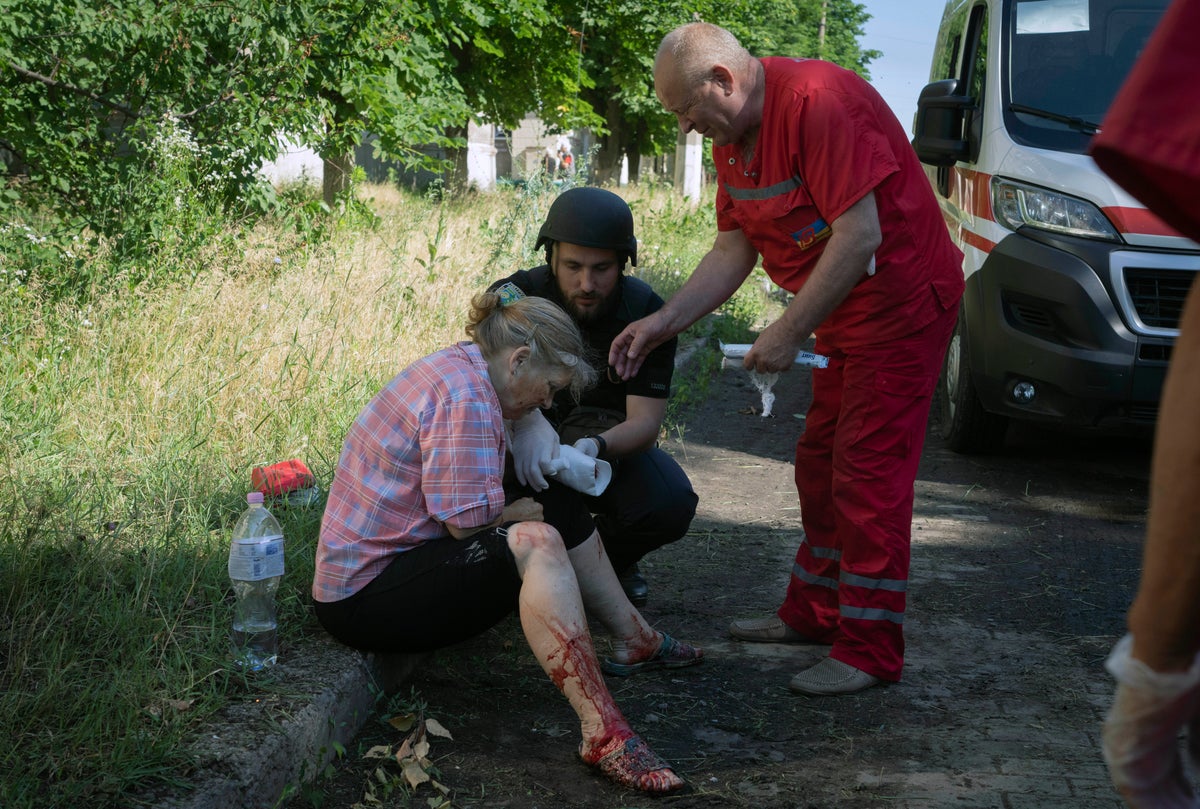
Russia was mounting an all-out assault on the last Ukrainian stronghold in the eastern Luhansk region, “pouring fire" on the city of Lysychansk from the ground and air, the local governor said Monday, as Western leaders met to discuss ways of bolstering support for Kyiv.
Luhansk Gov. Serhiy Haidai said Russian forces were pummeling Lysychansk after capturing the neighboring city of Sievierodonetsk in recent days. It's part of a stepped-up Russian offensive to wrest the broader Donbas region from Ukrainian government control in what Western experts say has become the new main goal of President Vladimir Putin's war in Ukraine, now in its fifth month.
“They’re pouring fire on the city both from the air and from the ground. After the takeover of Sievierodonetsk, the enemy army has concentrated all its forces on capturing (our) last stronghold in the Luhansk region: Lysychansk,” Haidai told The Associated Press.
The Russians were trying to blockade the city from the south, “destroying everything that their artillery and multiple rocket launchers can reach,” Haidai said.
Over the past week, the Russian army has captured several villages and towns southeast of Lysychansk, now a staging area for airstrikes and shelling attacks.
The office of President Volodymyr Zelenskyy said at least six civilians were killed and 31 others injured as part of intense Russian shelling against various cities over the past 24 hours — including Kyiv and major cities in the country's south and east.
It said Russian rocket attacks killed two and injured five overnight in Kharkiv, Ukraine’s second-largest city, and its surrounding area. Russian forces also continued to target the key southern port of Odesa, with a missile attack destroying residential buildings and injuring six, including a child, it said.
The southern city of Mykolaiv likewise saw Russian shells hit civilian infrastructure, including a kindergarten, the president's press office said. It did not give details of any casualties.
In Lysychansk, at least five high-rise buildings in the city and the last road bridge were damaged over the past day, Haidai said. A crucial highway linking the city to government-held territory further south was rendered impassable because of shelling — but it hasn't been captured, he said.
Such shelling is also making the evacuation of civilians increasingly difficult, Haidai said. The city had a pre-war population of around 100,000, approximately half of whom remain.
Analysts say that Lysychansk’s location high on the banks of the Siverskiy Donets river, as well as its large area dotted with hills, give a major advantage to the city’s Ukrainian defenders.
“It’s a very hard nut to crack. The Russians could spend many months and much effort storming Lysychansk,” military analyst Oleh Zhdanov told the AP.
The Siverskiy Donets river encloses Lysychansk from the north and east, while the Ukrainian army continues to hold territory west of the city, which it uses to supply arms and humanitarian aid. Moscow has now moved to attempt to block Lysychansk from the south.
To the west, in the government-controlled city of Sloviansk, local authorities accused Russian forces of firing a cluster bomb, saying it hit a residential neighborhood after dawn on Monday.
Authorities say the number of dead and injured are still to be confirmed; the AP saw one fatality. A man’s body lay hunched over a car door frame, his blood pooling onto the ground from scattered chest and head wounds. A woman, bandaged and covered in blood, sat shocked by the roadside, waiting for medics to arrive.
The shockwave from the explosion blew out most of the windows in the surrounding apartment blocks and the cars parked below, littering the ground with broken glass.
“In the last week we have seen an increase in the use of these cluster bombs” said Sloviansk Mayor Vadim Lyakh, who was helping coordinate the emergency response. “As you can see, there is no military base here. This was a residential area where there were only civilians.”
Local resident Valentina Vitkovska cried as she spoke about the impact of the explosion.
“Everything is now destroyed. We are the only people left living in this part of the building. There is no power. I can’t even call to tell others what had happened to us” she said.
OTHER DEVELOPMENTS:
— Britain’s defense ministry says Russia's military will increasingly rely on reserve forces for its war in Ukraine.
The main focus of Russia’s operations remains in the Sievierodonetsk-Lysychansk area, but Moscow “is now trying to regain momentum on the northern Izium axis,” the U.K. Ministry of Defense said in its daily intelligence update.
The Russian government remains “reluctant to order a general mobilization,” the statement said.
Analysts have said such a call in Russia could vastly alter the balance in the war, but could also come with political consequences for President Vladimir Putin's government — which still calls Russia's invasion a “special military operation” in Ukraine.
“Over the coming weeks, Russia’s campaign will highly likely increasingly rely on echelons of reserve forces,” it said.
— In Germany's Bavarian Alps, leaders of the Group of Seven countries appeared ready to respond to Zelenskyy's call for more air defense systems after Russian troops hit Kyiv with long-range missiles on Sunday. The U.S. appeared set to announce the purchase of an advanced surface-to-air missile system for Ukraine.
Zelenskyy spoke Monday by video link to the G-7 summit, but immediate details were few during the closed-door uplink session.
— The president of Moldova traveled to neighboring Ukraine on Monday and visited the town of Bucha — the site of an alleged Russian massacre of civilians earlier in the war — among other Kyiv suburbs.
“No matter the economic costs, no matter political costs we have to stop war and we have to make sure that these kinds of atrocities will never repeat,” Maia Sandu said. She said it was “heartbreaking” to hear accounts from witnesses and victims of the war.
Sandu was expected to meet with Zelenskyy during her visit, her office said on social media.







